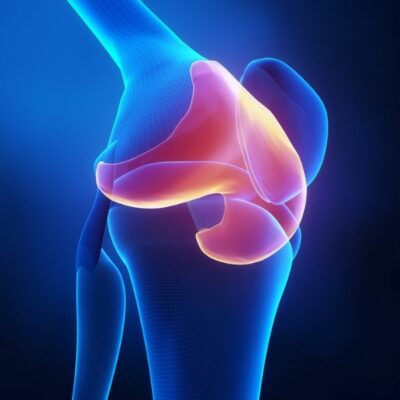Knee Cartilage Injury Specialist

Are you an athlete who participates in contact sports? If so, you may be at risk of sustaining a knee cartilage injury. Cartilage injuries are often caused by trauma, contact sports, repetitive weight bearing, and age related degeneration. Knee cartilage injury specialist, Dr. James Mazzara provides diagnosis and both surgical and nonsurgical treatment options for patients in Manchester, South Windsor, Enfield, Glastonbury and surrounding Hartford communities who have sustained a knee cartilage injury. Contact Dr. Mazzara’s team today!
Cartilage Injuries of the Knee
What is a Knee Cartilage Injury?
Cartilage is found throughout the body; it is the white, firm, flexible connective tissue that covers the ends of the bones. Healthy cartilage allows bones to move and glide over each other without pain and with minimal friction. In the knee there are two kinds of cartilage. Articular, or hyaline, cartilage forms the covering of the end of the bone and is typically what wears out in osteoarthritis. Meniscus cartilage is a curved cushion like structure in the knee. Each knee will have two menisci, one on the inside of the knee (medial meniscus) and one on the outside of the knee (lateral meniscus). Cartilage is relatively tough, although it can be damaged or injured and the results can be painful, affecting mobility. When a knee cartilage injury occurs, such as a torn cartilage in the knee, it is important to talk to an orthopedic physician to determine the extent of the injury and how it should be treated. Dr. James Mazzara, knee specialist serving Manchester, South Windsor, Enfield, Glastonbury and surrounding Hartford communities has extensive experience and success in treating a knee cartilage injury and other cartilage disorders, returning patients to their normal activities.
It’s important to note that cartilage does not have its own blood supply, so it does not have the ability to heal itself after a tear or injury. If left untreated, a knee cartilage injury can cause deterioration in the joint, leading to degenerative disorders like osteoarthritis.
What Causes a Knee Cartilage Injury?
A knee cartilage injury can occur from an injury at work, trauma, overuse, sports injuries or age-related degeneration. Obesity is also a leading contributing factor in the development of osteoarthritis. If cartilage has been separated from the bone, causing it to float within the joint, it is called “loose bodies.” This may be caused by an abnormal twisting motion, as with a traumatic injury, it can cause mechanical symptoms such as locking and catching. Daily wear and tear can also cause stress on the joint and result in knee cartilage injury.
Specific incidents which may affect the knee cartilage can include:
- Meniscus tear: Usually a forceful twist that causes injury and tears a piece of the cartilage. Some patients may develop a meniscus tear with little trauma as a result of existing degenerative changes in the knee.
- Joint Dislocation: Often a blow to the knee, as in contact sports such as football, causes the knee joint to be forced out of its normal position.
- Impact: A fall or a blow can tear or injure the cartilage.
- Arthritis is a degenerative breakdown of the cartilage which may lead to pain and swelling from inflammation and surfaces of the joint which are grinding down as they wear out.
- Inflammatory arthritis, such as rheumatoid arthritis, may damage the cartilage when the body’s own autoimmune system causes inflammation which damages the cartilage. This occurs even without any degenerative or wear and tear changes in the knee.
- Infection: A condition called septic arthritis can cause damage to the joint cartilage as well.
What are the Symptoms of a Knee Cartilage Injury?
There are several different symptoms of a knee cartilage injury some of the most common are:
- Pain may be sharp with activity and motion or dull and achy even at rest.
- Swelling and stiffness are usually due to inflammation and swelling in the knee from arthritis, but can also occur with a meniscus tear.
- Stiffness after resting or being immobile for some time or upon awakening in the morning is called start up pain and is typical of an inflamed arthritis joint.
- Catching, locking, clicking and even grinding of the knee may occur from loose fragments of cartilage, worn out joint surfaces or meniscus tears.
- Difficulty with standing or walking due to pain, stiffness, or knee swelling.
How are Cartilage Injuries Diagnosed?
Dr. Mazzara will conduct a thorough history and background, along with a physical examination of the knee. In some cases, a knee injury does not coincide with symptoms of knee pain or weakness and may overlap with other injuries to the joint. If a cartilage injury is suspected, Dr. Mazzara will always perform specially positioned weight bearing x-ray of the knee to evaluate for bone injury, joint alignment and arthritis. If there is some question regarding the extent of the injury, an MRI will be ordered.
How is an Injury of the Knee Cartilage Treated?
Once a knee cartilage injury has been diagnosed, Dr. Mazzara will explain the injury and the best treatment options for the patient.
Does Cartilage Damage Require Surgery?
Depending on the type, location and severity of the tear, many patients respond well to a non-surgical approach. This includes rest, ice, compression and elevation (RICE) of the knee. Anti-inflammatory medication can be prescribed to help with swelling and pain. In certain cases, injections of cortisone or other biologic agents may help alleviate symptoms and improve function. Physical therapy can be extremely helpful in helping patients recover from cartilage injuries by improving flexibility and strengthening those muscles which may have been injured or may be weak leading to the injury itself.
How is Cartilage Damage Treated with Surgery?
There are several surgical options used to repair an injured knee cartilage. Dr. Mazzara will carefully consider the patient age, activity level, type of tear and size of lesion. Here are a few possible surgical treatments options:
- Debridement (shaving): Done arthroscopically, this procedure smooths down, or shaves the damaged cartilage. Loose debris are removed to prevent further irritation.
- Microfracture: Also called marrow stimulation, this procedure is used to treat damaged areas of articular cartilage in the knee. Small holes are made in the bone, causing it to bleed which stimulates healing and neocartilage (new cartilage) formation.
- Autologous Chondrocyte Implantation (ACI): This is a surgical procedure where cartilage fragments are taken from the knee during a surgical procedure called an arthroscopy. These harvested pieces of cartilage are then sent to a special laboratory where they are grown and multiply for a second procedure when they are implanted in the cartilage defect in the patient’s knee.
- DeNovo uses juvenile cartilage cells from a donor which are implanted into a defect in a patient’s knee.
If you have questions about treatment options for a knee cartilage injury, or to inquire about knee pain and other related symptoms, please contact the orthopedic offices of Dr. James Mazzara, orthopedic knee specialist in Manchester, South Windsor, Enfield, Glastonbury and surrounding Hartford communities.
